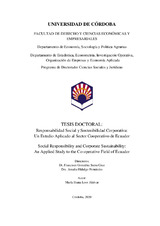Mostrar el registro sencillo del ítem
Responsabilidad Social y Sostenibilidad Corporativa: Un Estudio Aplicado al Sector Cooperativo de Ecuador
| dc.contributor.advisor | González Santa Cruz, Francisco | |
| dc.contributor.advisor | Hidalgo Fernández, Amalia | |
| dc.contributor.author | Loor Alcívar, Iliana | |
| dc.date.accessioned | 2020-06-01T11:36:13Z | |
| dc.date.available | 2020-06-01T11:36:13Z | |
| dc.date.issued | 2020 | |
| dc.identifier.uri | http://hdl.handle.net/10396/20053 | |
| dc.description.abstract | La responsabilidad social y la sostenibilidad corporativa son constructos complejos, amplios y multidimensionales que buscan un equilibrio entre las actuaciones empresariales, la naturaleza y la comunidad. Sin embargo, a pesar de ser objeto de diversas investigaciones, se ha llegado a argumentar que no tienen una definición universal, razón por la que resulta difícil su estudio, medición y, más aún, la determinación de una posible relación entre los mismos, puesto que para la presentación de informes y balances sociales son utilizados como sinónimos por parte de los gerentes y administradores. En este sentido, la presente tesis doctoral pretende proporcionar evidencias empíricas de la posible relación causal entre ambos constructos, en el sector específico de las cooperativas ecuatorianas. Para ello, se presenta un estudio ampliado de las teorías que han surgido con el paso del tiempo, que conllevan a la selección de los modelos teóricos de Carroll (1979) para la responsabilidad social, y de Chow y Chen (2012), Lee y Saen (2012) y Simões y Sebastiani (2017) para la sostenibilidad corporativa. Inicialmente se desarrolla la adaptación de dichos modelos al cooperativismo de este país en vías de desarrollo. Así también se efectúa la validación estadística de las escalas propuestas, a través de modelos de ecuaciones estructurales basados en la covarianza (CB-SEM), obteniendo como resultado que cada constructo puede ser medido en escalas de quince ítems y cuatro dimensiones. El estudio presenta además el análisis empírico de las relaciones causales entre los constructos, con la finalidad de determinar el posible efecto de las dimensiones de la responsabilidad social sobre las dimensiones de la sostenibilidad corporativa. Dicho análisis se efectúa utilizando inicialmente la matriz de correlación lineal de Pearson, que busca comprobar la no existencia de problemas de colinealidad. Posteriormente se trabaja con varios modelos de ecuaciones estructurales basados en la covarianza. Producto de este análisis se obtuvo como resultado que las dimensiones de la responsabilidad social tienen un efecto significativo en las dimensiones de la sostenibilidad corporativa, siendo la de mayor puntuación la dimensión social del segundo constructo, explicando el 30.2% de la varianza de dicha dimensión. | es_ES |
| dc.description.abstract | Social responsibility and cooperative sustainability are complex constructs, broad and multidimensional that looks for an equilibrium between enterprise action, nature, and the community. Nonetheless, even though it is subject to many investigations, it has been said that it does not have a universal definition. For this reason, the study, measurement, and specially the determination of a possible relation among them, results in a very hard task, because the presentation of reports and social balances are used as synonyms on the part of management and administrators. In this way, this doctoral thesis hopes to offer some empiric evidences of the possible causal relation among these constructs, in the specific sector of Ecuadorian cooperatives. For this, a broad study about the different theories that have appeared over time, is presented. Which takes us to the election of theoretical models from Carroll (1979) for social responsibility, and from Chow and Chen (2012), Lee and Saen (2012) and Simões and Sebastiani (2017) for cooperative sustainability. Initially we must develop the adaptation of those models to corporatism of this developing country. In the same way the statistic validation of the proposed scales, through covariance based of structural equations models (CB-SEM), getting as a result that each construct can be measured in fifteen items and four dimensions. In The study also shows the empiric analysis of the causal relations between the constructs, to the effect of determining the possible effect of the dimensions of social responsibility over the dimensions of corporative sustainability. This analysis is done using initially the matrix of Pearson's linear correlation, which search to check the non-existence problems of collinearity. Later, many covariance based of structural equations models will be the objects of work. As the result of this analysis, it shows that the dimensions of social responsibility have a significant effect on the dimensions of corporative sustainability, being of higher score the social dimension of the second construct, explaining the 30.2% of variance about the previously mentioned dimension. | es_ES |
| dc.format.mimetype | application/pdf | es_ES |
| dc.language.iso | spa | es_ES |
| dc.publisher | Universidad de Córdoba, UCOPress | es_ES |
| dc.rights | https://creativecommons.org/licenses/by-nc-nd/4.0/ | es_ES |
| dc.subject | Cooperativismo | es_ES |
| dc.subject | Responsabilidad social corporativa | es_ES |
| dc.subject | Sostenibilidad corporativa | es_ES |
| dc.subject | Cooperativas | es_ES |
| dc.subject | Economía social | es_ES |
| dc.subject | Ecuador | es_ES |
| dc.title | Responsabilidad Social y Sostenibilidad Corporativa: Un Estudio Aplicado al Sector Cooperativo de Ecuador | es_ES |
| dc.title.alternative | Social Responsibility and Corporate Sustainability: An Applied Study to the Co-operative Field of Ecuador | es_ES |
| dc.type | info:eu-repo/semantics/doctoralThesis | es_ES |
| dc.rights.accessRights | info:eu-repo/semantics/openAccess | es_ES |

